Related Research Articles

The Army of Northern Virginia was the primary military force of the Confederate States of America in the Eastern Theater of the American Civil War. It was also the primary command structure of the Department of Northern Virginia. It was most often arrayed against the Union Army of the Potomac.
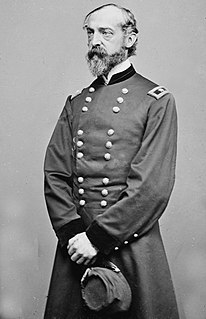
George Gordon Meade was a United States Army officer and civil engineer best known for decisively defeating Confederate General Robert E. Lee at the Battle of Gettysburg in the American Civil War. He previously fought with distinction in the Second Seminole War and the Mexican–American War. During the Civil War, he served as a Union general, rising from command of a brigade to that of the Army of the Potomac. Earlier in his career, he was an engineer and was involved in the coastal construction of several lighthouses.

The Army of the Potomac was the principal Union Army in the Eastern Theater of the American Civil War. It was created in July 1861 shortly after the First Battle of Bull Run and was disbanded in June 1865 following the surrender of the Confederate Army of Northern Virginia in April.

John Grubb Parke was a United States Army engineer and a Union general in the American Civil War. Parke's Civil War service was closely associated with Ambrose E. Burnside, often serving him as chief of staff in major engagements such as Antietam, Fredericksburg and the Overland Campaign. Parke also held significant field commands during Burnside's North Carolina Expedition, Vicksburg and the battle of Fort Stedman as well as brief stints in command of the Army of the Potomac.

Horatio Gouverneur Wright was an engineer and general in the Union Army during the American Civil War. He took command of the VI Corps in May 1864 following the death of General John Sedgwick. In this capacity, he was responsible for building the fortifications around Washington DC, and in the Overland Campaign he commanded the first troops to break through the Confederate defenses at Petersburg. After the war, he was involved in a number of engineering projects, including the Brooklyn Bridge and the completion of the Washington Monument, and served as Chief of Engineers for the U.S. Army Corps of Engineers.

The Army of the James was a Union Army that was composed of units from the Department of Virginia and North Carolina and served along the James River during the final operations of the American Civil War in Virginia.
The First Vermont Brigade, or "Old Brigade" was an infantry brigade in the Union Army of the Potomac during the American Civil War. It suffered the highest casualty count of any brigade in the history of the United States Army, with some 1,172 killed in action.
XXIV Corps was a corps of the Union Army during the American Civil War.

The Second Battle of Petersburg, also known as the Assault on Petersburg, was fought June 15–18, 1864, at the beginning of the Richmond–Petersburg Campaign. Union forces under Lt. Gen. Ulysses S. Grant and Major General George G. Meade attempted to capture Petersburg, Virginia, before Gen. Robert E. Lee's Confederate Army of Northern Virginia could reinforce the city.

The Eastern Theater of the American Civil War consisted of the major military and naval operations in the states of Virginia, West Virginia, Maryland, and Pennsylvania, the District of Columbia, and the coastal fortifications and seaports of North Carolina.
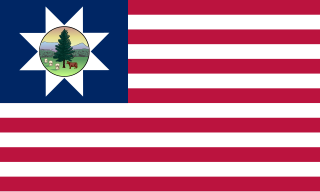
The 6th Vermont Infantry Regiment was a three years' infantry regiment in the Union Army during the American Civil War. It served in the Eastern Theater, predominantly in the VI Corps, Army of the Potomac, from October 1861 to June 1865. It was a part of the Vermont Brigade.

The 1st Vermont Cavalry Regiment was a three years' cavalry regiment in the Union Army during the American Civil War. It served in the Eastern Theater from November 1861 to August 1865, in the Cavalry Corps, Army of the Potomac.
The William E. Colby Military Writers' Award was established in 1999 by the William E. Colby Military Writers' Symposium at Norwich University in Vermont in order to recognize "a first work of fiction or non-fiction that has made a major contribution to the understanding of intelligence operations, military history, or international affairs." It is named in honor of William Egan Colby. As of 2021, Alex Kershaw is the chair of its selection committee.
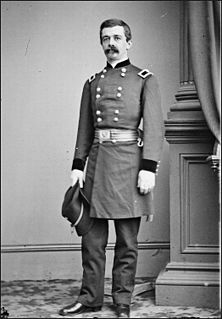
Henry Eugene Davies was an American soldier, writer, public official and lawyer. He served in the Union Army as a brigadier general of volunteers in cavalry service during the American Civil War and was promoted to the grade of major general of volunteers at the end of the war. Davies was one of the few nonprofessional soldiers in the Union cavalry in the East to be promoted to the grade of general. He led his brigade in several major battles, especially during the Overland Campaign, the Battle of Trevilian Station, the Siege of Petersburg and the Appomattox Campaign at the end of the war.
The 6th Ohio Cavalry Regiment was a cavalry regiment of the Union Army, which was raised in ten counties in northeastern and north-central Ohio for service during the American Civil War. It served primarily in the Eastern Theater in several major campaigns of the Army of the Potomac and was particularly active during the Gettysburg Campaign of 1863.

James Adams Cunningham was a volunteer officer in the Union Army during the American Civil War.
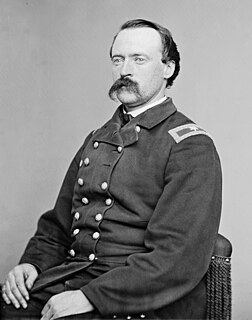
Oliver Edwards was a machine company executive, an inventor, and a volunteer officer in the Union Army during the American Civil War.

Ulysses S. Grant was the most acclaimed Union general during the American Civil War and was twice elected president. Grant began his military career as a cadet at the United States Military Academy at West Point in 1839. After graduation he went on to serve with distinction as a lieutenant in the Mexican–American War. Grant was a keen observer of the war and learned battle strategies serving under Generals Zachary Taylor and Winfield Scott. After the war Grant served at various posts especially in the Pacific Northwest; he was forced to retire from the service in 1854 due to accusations of drunkenness. He was unable to make a success of farming and on the onset of the Civil War in April 1861, Grant was working as a clerk in his father's leather goods store in Galena, Illinois. When the war began his military experience was needed, and Congressman Elihu B. Washburne became his patron in political affairs and promotions in Illinois and nationwide.

The 19th Regiment Massachusetts Volunteer Infantry was an infantry regiment that served in the Union Army during the American Civil War.
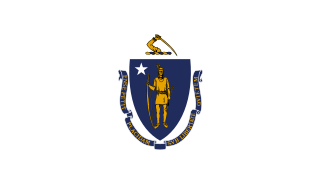
The 57th Regiment Massachusetts Volunteer Infantry was a regiment of infantry that served in the Union Army during the American Civil War. It was one of the four "Veteran Regiments" raised in Massachusetts during the winter of 1863–64. Recruits of these regiments were required to have served at least nine months in a prior unit. Colonel William F. Bartlett, at age 24 already a veteran of three regiments, organized the recruiting and formation of the 57th Massachusetts and served as its first commanding officer.
References
- ↑ Sodergren, Steven E. The Army of the Potomac in the Overland & Petersburg Campaigns: Union Soldiers and Trench Warfare, 1864-1865. Baton Rouge: Louisiana University Press, 2017. ISBN 9780807165560 OCLC 951854768
- ↑ "Civil War history wins $5,000 award". Associated Press.
- ↑ "Colby Award Goes to Norwich Professor".